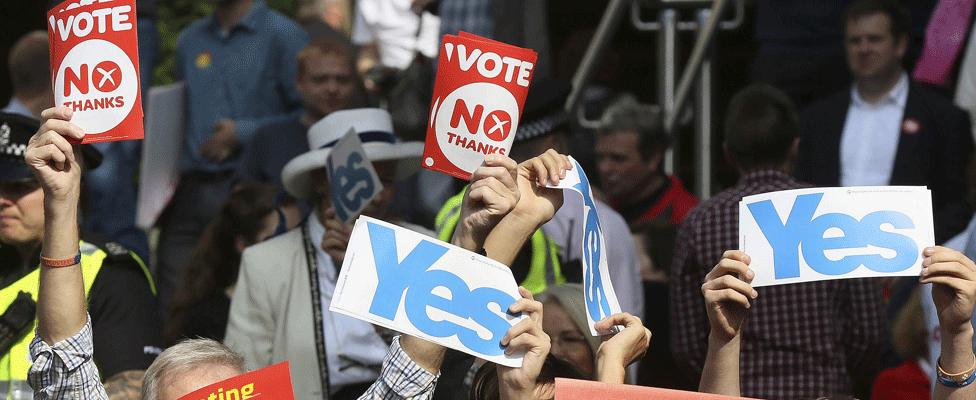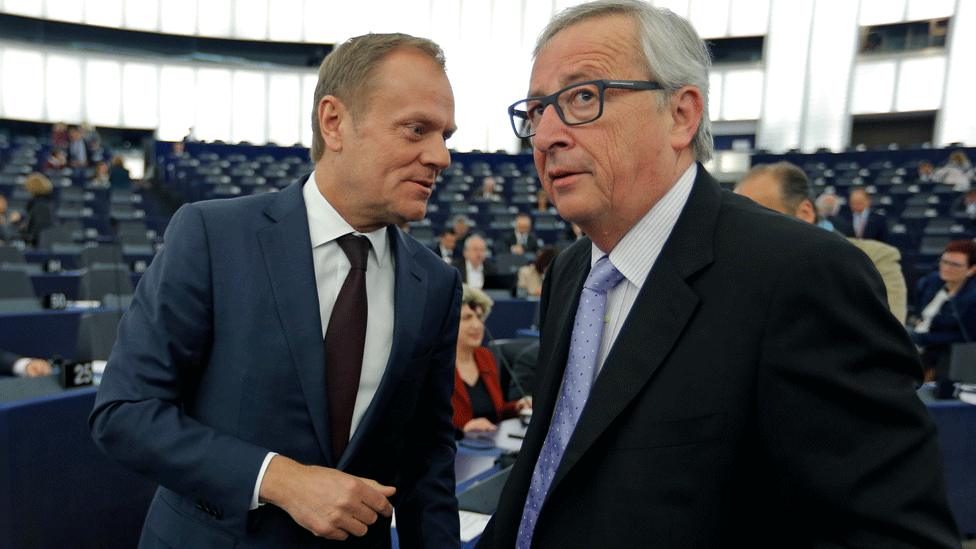Sturgeon sets up expert group to advise on aftermath of Brexit vote
- Published
Council members will have expertise in finance, economics, European and diplomatic matters
Scotland's First Minister Nicola Sturgeon has set up a "standing council" of experts to provide her with advice following the Brexit vote.
She was speaking at Holyrood after last week's UK referendum resulted in voters backing to leave the EU by 52% to 48%.
Electors in Scotland, Northern Ireland and London voted to remain in the EU.
Ms Sturgeon, who will travel to Brussels on Wednesday for talks, said she was "utterly determined" to protect Scotland's relationship with Europe.
She will meet European Parliament President Martin Shulz and was hoping to talk to President of the European Council, Donald Tusk, but he said it was not appropriate at this time.
On Tuesday afternoon, Ms Sturgeon told MSPs that "all the impacts" of the referendum result needed to be set out and evaluated and "all of the options" open to Scotland in securing its relationship with the EU needed to be looked at.
Scotland's leader said the expert council would be chaired by Professor Anton Muscatelli, Glasgow University's principal and vice chancellor, and would have 17 members, including politicians, economists and constitutional experts.
Ruth Davidson said the result did not justify a second independence referendum
Ms Sturgeon explained: "Members will consider the impact of proposed changes to the UK's relationship with the EU on Scottish interests and advise ministers throughout our negotiations on the best way to secure Scottish interests and objectives."
The SNP leader also said that while she was not seeking endorsement to hold a second independence referendum "today", she would put the option forward if it emerged as the only or best way to protect Scotland's place in the EU.
However, Scottish Conservative leader and Remain supporter Ruth Davidson fired a warning over a second independence vote.
She said: "You don't dampen the shockwaves from one referendum by lighting the fuse for another."
Ms Davidson also said that the Brexit vote was a "defining moment" in "our country's story".
Her speech included a message to EU migrants;. She said: "This is your home, we don't just need your labour, we want your brains, values, culture - we want you."

What might a second independence referendum be?

By Brian Taylor, BBC Scotland political editor
Remember that we are in deeply uncertain times. Nobody has a fixed idea as to what might emerge. We are all constantly pressing the refresh button on the BBC's excellent Online pages to find out who is the latest to resign.
But the chat at Holyrood - inevitably speculative - mostly seems to centre upon a possible indyref2 in spring 2018. I stress that is very, very far from fixed. Emphatically not, to quote the FM. It may happen in 2017 or not at all.
The 2018 timetable works like this. It is expected that the UK Government will initiate the Section 50 process of departure from the EU in autumn this year.
There then begins two years of negotiations about the terms of departure in which the UK will seek to obtain the best possible trade deal - consistent, presumably, with the Leavers' key demand that there must be substantial constraints placed upon freedom of movement to these islands.
That takes us to Autumn 2018 - unless all 27 remaining EU member states agree to an extension. At that point, either a deal is struck or an extension is agreed or the UK departs without a deal, resorting to WTO rules.
If Scotland is to be permitted to sidestep that departure, there would need to be a referendum within the two year period. There would need to be a clear vote in favour of independence in time to permit even the prospect of Scotland retaining / recreating EU membership. I stress, even the prospect.
Which points to Spring 2018 at the latest.

The debate which followed Ms Sturgeon's statement included responses from Labour, the Scottish Greens and the Scottish Liberal Democrats as well as the Tories and the SNP.
The first minister's motion - to explore options for protecting Scotland's relationship with the EU - was supported by 92 MSPs with 31 abstaining.
In her address to the chamber, Scottish Labour leader Kezia Dugdale said her party would support the government's efforts "to not only mitigate the worst of Brexit, but to strengthen Scotland's ties with our European neighbours and allies".
She insisted that the priority "must be" to secure jobs and the rights of workers.
'Is it a cunning plan?'
Patrick Harvie, co-convener of the pro-independence Scottish Greens, backed early preparations for another independence referendum.
He told the chamber: "It may be that after exploring all options far more people than voted Yes in 2014 may conclude that independence is the only way to achieve it.
"The 2014 [independence referendum] result is now fundamentally superseded."

Ms Sturgeon's trip to Brussels on Wednesday will not involve meetings with Donald Tusk and Jean Claude Juncker
Ms Sturgeon is expected to win cross-party support from the emergency debate which followed her statement.
On Wednesday, the first minister will travel to Brussels to meet Mr Shulz. However, there is no planned get-together with Jean-Claude Juncker, President of the European Commission.
The leader of the Scottish Liberal Democrat Party, Willie Rennie, said he welcomed Ms Sturgeon "reaching out" to other parties.
However, he cautioned: "I immediately agreed to participate as long as it is not a cunning plan to deliver independence.
"I want to explore options; whether it is reverse Greenland; working with London, Northern Ireland, Gibraltar or some other arrangement.
"But we need to fully understand before we move ahead. And rushing head long to independence will undermine those efforts."